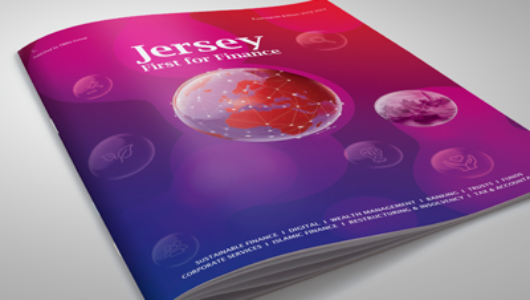Karolina Pilcher › Senior Strategy and Research Manager, Jersey Finance
email › / profile ›
The high levels of skills, training and experience within our financial and professional services workforce have contributed greatly to Jersey’s reputation as an international finance centre (IFC) of excellence.
Looking to the future, we recognise the need to work proactively to maintain and develop this level of service provision – in fact, doing so will be one of the key differentiators as a leading IFC.
As the global landscape continues to shift, the priorities and requirements of clients are changing. We have seen this recently, for instance, with the rise of environmental, social and governance (ESG) and the ever growing demand for individuals to be confident in the digital and technological arenas.
Following the developments and increased digitalisation of the last two years, digital skills have become a vital attribute for the modern workforce. Ensuring that we have the experts on-Island to allow us to lead in these emerging spaces will be crucial in maintaining the strong reputation and high quality of our thriving international finance centre.
Also, the expanding range of required skills is not the only hurdle to future-proofing Jersey’s IFC. Like most jurisdictions, we are facing a number of challenges, both short-term, in staff shortages and recruitment and longer-term, such as succession planning. Other factors like Brexit have further complicated this area by increasing the difficulty of bringing in skilled professionals from Europe, exacerbated by increasing international competition for key hires.
The battle for finding and retaining talent has never been harder. This is why our ‘Future Fit Workforce’ workstream was established, led by Jersey Finance’s Strategy and Research Team.
Building on best practice and existing work in this space from across the sector, we identified and documented key reports on skills-related topics, working groups, current schemes and initiatives as well as relevant ongoing or planned project work taking place in Jersey.
In addition to this, we engaged with our Members to better understand their current challenges around skills and to make sure that the voice of the industry is being heard. By mobilising
several industry focus groups as well as other channels of communication with various stakeholders, we developed our insight into areas of high priority to tackle the future skills gap. These groups revealed some challenges with engagement, diversity and succession planning and upskilling, as well as reskilling our workforce in an environment which enables talent to thrive.
Regarding engagement with young people, it is apparent that the financial services industry is facing particular challenges in attracting individuals at a junior level. Appealing to and working with young people is absolutely paramount in order to secure a sustainable skills base and a capable future workforce to uphold the high standards of our industry.
We have seen more than 3,000 young Islanders set out on a career in finance over the last decade and we hope to see this number continue to rise to meet the growing demand. Feedback from our focus groups suggested the perception of the finance industry among this demographic could be further improved through promoting the industry’s efforts regarding sustainability, societal impacts and diversity, as well as highlighting the countless opportunities and benefits on offer – career progression in a wide variety of roles, international prospects and transferable skills, to name only a few.
Emphasising the huge range of career opportunities available in the industry may also help to dispel outdated myths of what working in finance ‘looks like’. With so many different sectors – from banking to marketing, law to IT and funds to trust companies – there is more variety than many students may be aware of. Each of the choices on offer provides an avenue for young people to develop their career, travel, learn, be creative, work with clients and be involved in one of the most dynamic and forward-thinking industries in the world.
As part of our work to communicate these messages, Jersey Finance currently offers a number of schemes, events and awards designed to grow local talent.
These include our ‘Future Connect’ initiative, which offers networking and development opportunities to those starting out their careers in the finance sector and ‘Life in Finance’, which pairs A-Level students with financial services businesses offering summer work experience on the Island. Future Connect members can also take part in our mentoring scheme which matches those in junior roles with senior professionals who are able to offer advice on career progression.
Outside of these existing schemes, mentoring and work shadowing opportunities are an incredibly valuable way for students and early-career professionals to meet and learn from internationally experienced and highly motivated individuals and we are actively working with our Member firms to consider these opportunities in their workplace. Building relationships between students and organisations benefits both sides, as it allows employers to demonstrate the many benefits they have to offer and may contribute to attracting students to return to Jersey after university.
Jersey Finance also promotes the development of young talent in the Island with our ‘Rising Stars’ awards, which celebrate young professionals who are having a real impact in their workplace and who will undoubtedly be industry leaders in years to come. This year, the third ‘Rising Stars’ awards saw over 150 people aged between 16 and 30 nominated across 14 categories, including our new categories for ‘diversity and inclusion’ and ‘sustainability’.
Of course, the issue of supporting the industry’s workforce into the future is multifaceted and nuanced. Encouraging young people to join the industry and supporting their development in the early stages of their careers are just two out of the many approaches required to tackle the future skills gap.
On an industry level, we must invest in the skills required by the finance sector to ensure that the local talent pool is strong enough to remain competitive and sustain growth with minimal reliance on importing talent. Whilst there are benefits to welcoming external expertise, this comes with a requirement to invest significant time in building up detailed knowledge of our jurisdiction.
In the cases where attracting talent from further afield is necessary, this must be supported more widely by the Island’s policies on migration, population and housing – factors which,
of course, also impact whether local young people can afford to remain on the Island.
Alongside this, the numerous issues preventing professionals from taking up or returning to employment, such as childcare provision and its associated costs, must be tackled and efforts to increase diversity among the workforce must continue to spearhead progress.
Each of these factors – and many more besides – will have an impact on what the financial services workforce looks like in 10, 20 or 50 years’ time. Whilst our future will be shaped and supported increasingly by digital tools, ultimately our business is a people business. By prioritising our people now, we are positioning ourselves strongly in order to maintain the reputation we have earned as an IFC of genuine expertise and excellence, built on positive relationships.


